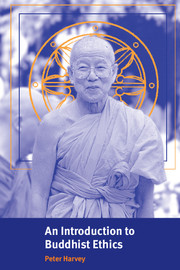Book contents
- Frontmatter
- Contents
- List of plates
- Acknowledgements
- List of abbreviations
- A note on language and pronunciation
- Introduction
- 11 THE SHARED FOUNDATIONS OF BUDDHIST ETHICS
- 12 KEY BUDDHIST VALUES
- 13 MAHĀYĀNA EMPHASES AND ADAPTATIONS
- 14 ATTITUDE TO AND TREATMENT OF THE NATURAL WORLD
- 15 ECONOMIC ETHICS
- 16 WAR AND PEACE
- 17 SUICIDE AND EUTHANASIA
- 18 ABORTION AND CONTRACEPTION
- 19 SEXUAL EQUALITY
- 10 HOMOSEXUALITY AND OTHER FORMS OF ‘QUEERNESS’
- Glossary and details of historical figures and texts
- List of references
- Useful addresses
- Index of Buddhist texts, schools cultural areas, movements and organizations
- Index of concepts
- Index of names
11 - THE SHARED FOUNDATIONS OF BUDDHIST ETHICS
Published online by Cambridge University Press: 05 June 2012
- Frontmatter
- Contents
- List of plates
- Acknowledgements
- List of abbreviations
- A note on language and pronunciation
- Introduction
- 11 THE SHARED FOUNDATIONS OF BUDDHIST ETHICS
- 12 KEY BUDDHIST VALUES
- 13 MAHĀYĀNA EMPHASES AND ADAPTATIONS
- 14 ATTITUDE TO AND TREATMENT OF THE NATURAL WORLD
- 15 ECONOMIC ETHICS
- 16 WAR AND PEACE
- 17 SUICIDE AND EUTHANASIA
- 18 ABORTION AND CONTRACEPTION
- 19 SEXUAL EQUALITY
- 10 HOMOSEXUALITY AND OTHER FORMS OF ‘QUEERNESS’
- Glossary and details of historical figures and texts
- List of references
- Useful addresses
- Index of Buddhist texts, schools cultural areas, movements and organizations
- Index of concepts
- Index of names
Summary
Life is dear to all. Comparing others with oneself, one should neither kill nor cause to kill. Whoever, seeking his own happiness, harms … beings, he gets no happiness hereafter.
Dhammapada 130–1Fundamental features of Buddhism's world-view relevant to ethics are the framework of karma and rebirth, accepted by all schools of Buddhism, with varying degrees of emphasis, and the Four Noble Truths, the highest teachings of early Buddhism and of the Theravāda school. In the Mahāyāna tradition, an increasing emphasis on compassion modified the earlier shared perspective in certain ways, as will be explored in chapter 3.
SOURCES OF GUIDANCE TO BUDDHISTS
In ethics as in other matters, Buddhists have three key sources of inspiration and guidance: the ‘three treasures’ or ‘three refuges’: the Buddha, Dhamma and Saṅgha. The Buddha is revered as (1) the ‘rediscoverer’ and teacher of liberating truths and (2) the embodiment of liberating qualities to be developed by others. In addition, in the Mahāyāna, heavenly Buddhas are looked to as contemporary sources of teaching and help. The Dhamma is the teachings of the Buddhas, the path to the Buddhist goal, and the various levels of realizations of this goal. The Saṅgha is the ‘Community’ of Noble Ones (Pali ariyas; Skt āryas): advanced practitioners who have experienced something of this goal, being symbolized, on a more day-to-day level, by the Buddhist monastic Saṅgha (Harvey, 1990a: 176–9).
- Type
- Chapter
- Information
- An Introduction to Buddhist EthicsFoundations, Values and Issues, pp. 8 - 59Publisher: Cambridge University PressPrint publication year: 2000



